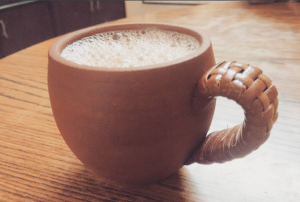The rain had stopped being furious. But, the motorists were murderous with their grumbling vehicles and grumpy faces. On any other day, I would have joined their never-ending serpentine queue. But that day, with a sinister smile on my face, I dodged the gridlocks, and reached home without complaining. Because, the bicycle is one of the best inventions, you see. I could have tried whistling while riding only to make my joie de vivre more evident. Sadly, I don’t know how to whistle. And, as soon as I reached home, father fixed me a steaming cup of tea; yes, father made a cup of tea for me.
When I was a child, and when mother fell sick, father would buy food from the local restaurants, and that always made me wonder why he wouldn’t cook. Mother told me, “Men do not have to cook.” I didn’t question that statement, and I didn’t buy it either. In the last two decades, I have seen my father cook only a handful of times. Needless to mention that the food was only so-so, and we would still thank him for making the effort. On those days, mother would wallow in guilt. She would blame her illness, and thank father profusely.
My parents, who are in their late fifties, seem to have changed a lot. What appears extraordinary to me is that they have exchanged roles unconsciously. Mother was ill one night, and I entered the kitchen to make a cup of tea for her. Father tasted it too, and was curious about how I made it. I taught him without knowing that from the next day, he would make numerous cups of tea for us. Mother doesn’t say anymore that men do not have to enter the kitchen. But, we still thank him profusely. I don’t get up from my chair, when mother hands the cup to me. However, I go to the kitchen to collect the cup, when father makes tea.
These days, regardless of when I wake up, father poses an array of questions to me, “Have you brushed? Tea for you? Or do you want to chill for a while?” I try hard to shrug off the strangeness of this kind ritual; It’s father who wants to make tea for me. I swallow the uneasiness, and tell him, “You make the best tea in the world.” He smiles. “This is all I have learnt to do,” he says, with a strong trace of humility in his tone.
I am happy because I live in a time, when my father enters the kitchen to make tea and boil rice. I am happy because father has changed despite not watching Chimamanda Ngozi Adichie’s TED talk. Maybe, it’s time for mother to watch this. She doesn’t have to drown in guilt, when father enters kitchen of his own accord. Maybe, I should watch this video again because I don’t have to feel small for not being fascinated by cooking in spite of being a woman.
I ask my father often, “Why have you taken a sudden liking to making tea?” He wears his brightest smile, stifles a giggle, and says in jest, “Tea-making is a beautiful Zennish ritual, you know. You must read Osho’s book on mindfulness…”
His tea, kissed with milk and pampered with sugar, is just perfect. It seems more remarkable to me because — forgive me for employing the cliches — the ingredients include a modified outlook, and unconditional love.
Deepika Ramesh is a reader, blogger, animal-lover, aspiring cyclist, and a sucker for tiny, warm moments. She blogs at https://worncorners.wordpress.com/






